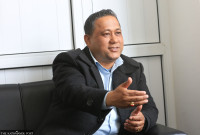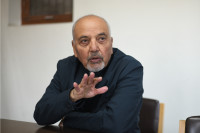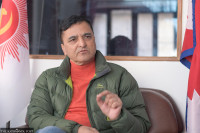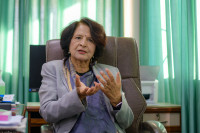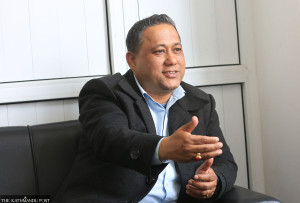Interviews
Both security forces, protesters violated human rights in Tarai
Nepal’s human rights records are under scrutiny as a part of UN Human Rights Council’s Universal Periodic Review
Nepal’s human rights records are under scrutiny as a part of UN Human Rights Council’s Universal Periodic Review (UPR), a mechanism that reviews rights situation of UN member countries every four years. This review comes amid violent protests in Tarai. Nepali delegates on Sunday left for Geneva to attend the 23rd UPR Session, in which the government will seek to defend its position on safeguarding human rights in the country. Mohna Ansari, spokesperson of the National Human Rights Commission, a rights watchdog, will also be attending the session. Dewan Rai and Apekshya Shah Rana spoke to Ansari about the rights situation and progress made so far.
What is the Universal Periodic Review (UPR) session and why is it important for Nepal?
The Universal periodic Review session is important for Nepal because it has an international obligation to promote, protect and respect human rights within the country. In this session, the human rights commitments made by a country in the past are evaluated. The session also reviews the change in the state of human rights brought about by the laws and policies along with their impacts on the lives of the people. The entire human rights situation of the country is discussed. And the countries that share close relations with Nepal can express their concerns and even raise questions regarding the human rights issue here. The government sees this session as an opportunity to lobby and advocate its human rights agendas and observe international opinions regarding the current situation in the country. It is also the responsibility of the state to make sure that the various National Human Rights Institutions (NHRIs) in the country are able to function in a neutral manner.
Even the National Human Rights Commission prepares a report for this session. How is it compiled?
Nepal participated in an UPR session for the first time in 2011. Since then, under the leadership of the National Human Rights Commission, all the NHRIs submit a single report. So the report that will be submitted by the NHRC in this coming session is prepared in conjunction with other commissions such as the Dalit Commission and Women Commission, among others.
In the last session, 135 recommendations were made to the Nepal government and subsequently, the government produced an implementation plan for 120 recommendations.
Many human rights issues were raised then as the conflict had already ended and the country was in transition. The government has made many amendments and introduced various human rights-related legislations since then. Even the new constitution ensures human rights. Still, the NHRC remains concerned about the proper implementation of the new policies.
What are the major highlights of this year in the UPR report prepared by the NHRC?
Impunity, extrajudicial killings and the bill of rights are a few important issues that we have reviewed for the UPR session. The bill of rights is related to torture which has been a long time concern in Nepal. One of the recommendations of the last UPR session was to criminalise torture and disappearance and Nepal had even committed to it. But this is yet to materialise in reality. According to our report, the citizenship rights and the political rights continue to be challenged in the country. The report consists of various incidents that took place in various places like Dailekh, Surkhet, Dhanusha, Bardiya, Nepalgunj and so forth. In addition, there are instances of police refusing to register first information reports against human right violators, which were later filed at NHRC. There have been many deaths in police custody as well.
What are the other failed commitments of the government?
The government has set up the Truth and Reconciliation Commission (TRC) and Commission for Investigation on Enforced Disappeared Persons (CIEDP). These can be seen as positive developments. But then the commissions have not been able to accomplish much for various reasons. Lack of resources allocated to the commissions might have hindered their work. There is an utter lack of sincerity on the part of the government. The secretary to these commissions was only appointed five months after their creation and the regulations for the commissions are yet to be passed. The government has not amended the Transitional Justice Act in line with the Supreme Court verdict as well. The government has not yet criminalised torture and disappearances. It is very important for both the TRC and CIEDP to function smoothly if the government wants to reduce impunity. Moreover, the longer the conflict victims are deprived of justice, the greater the chances for another conflict which could arise due to their grievances. Thus, there is an urgent need for the government to address the demands of the conflict victims.
What are the changes that have come about in Nepal with regard to human rights since 2011?
The country now has a new constitution. So phase one of the peace agreement has been completed. Even so, there is still need to promote human rights and more importantly, people should get to exercise their rights without fearing the state. Likewise, the state still needs to make efforts to empower marginalised groups such as Dalits and women. And though the new constitution ensures human rights as fundamental rights, it mentions that the fundamental rights can only be exercised according to the law. And it will take three years to create new laws. This is worrying because what happens if the laws are not prepared within these three years? Furthermore, even as winter is fast approaching the quake victims have still not received essential supplies. Their right to life is being seriously threatened at the moment.
How is the constitution in terms of human rights?
The constitution should be taken positively. The statute does ensure most of the human rights. Still, there are some problems regarding political representation. There are some disappointing provisions regarding education as well. And while the human rights have been enshrined as fundamental rights, the long time frame for these rights to become legally binding is a concern.
How do you read the current situation in the Madhes?
The protest in the Tarai has been continuing for almost three months now and the region remains very sensitive. Still hundreds of people are protesting in the roads. Schools, shops, businesses continue to remain shut. This is upsetting. The government needs to find a solution to the unrest at the earliest.
What about extrajudicial killings in the Madhes?
NHRC has been closely observing the situation in the Madhes and we just released a report with our findings. The use of excessive force by the state authorities has been quiet evident in the ongoing Madhes protests. The protesters on the ground have emphasised that instead of firing bullets, the police should have used other means to disperse the demonstrators such as water cannons. When we inspected the dead bodies of the protesters, most of them have been shot in the head or the chest. It was not necessary to do so. The security forces could have injured the protesters by aiming at their limbs. It is the responsibility of the state to protect its citizens but the government has completely failed to do so. The NHRC observed a clear use of excessive force by the state.
What about the protesters? There are documented evidences of them resorting to violence.
Yes, even the demonstrators have been violent in the protests. Their commitment to peaceful protests made to the NHRC was not honoured. Murdering people cannot be justified no matter who is committing it. The protesters have been accused of lynching 11 policemen in Tikapur and that incident is under investigation. Both the security forces and the protesters have violated human rights and this has disrupted the law and order situation in the Tarai.
What is the NHRC’s stand on the ongoing blockade?
The commission views the ongoing blockade as a humanitarian crisis. The shortage of fuel has crippled life in the country as businesses, hospitals, schools remain virtually shut. The reason for these prevailing circumstances is the protracted protests in the Tarai. The NHRC had met the then prime minister and had recommended him to reach out to the disgruntled parties and address their concerns on time to avoid any untoward situation. The Commission, through its statements released on various occasions, had urged both the government and the protesters to resolve their differences through dialogue. None of them paid heed to our recommendations. The commission visited 24 districts from Jhapa to Kanchanpur to monitor the situation on the ground. We found that the government aggravated the situation by not addressing Madhesi grievances. Now the protests are targeted at the border, the mobility of both goods and people in those areas have been completely disrupted. The relief and reconstruction work has been halted due to the ongoing crisis.
How well has the government handled the post-disaster situation?
The government did a good job in handling the post-disaster scenario in the first month. The Post Disaster Needs Assessment report was prepared; meetings were held between the political parties and there was lobbying for international aid. Later, the political parties shifted their focus to constitution writing and the formation of the government and lost sight of the plight of earthquake victims. Now, things are looking even grimmer as winter approaches. It has become difficult to deliver the basic necessities like warm clothes, blankets, medicines, among others, to the quake victims.
The government has not even established the National Reconstruction Authority even after six months of the quake. The government has severely failed to address the needs of the quake victims. The aid that was pledged by the donors during the International Conference on Nepal’s reconstruction has not been used either. The inadequacy of the government in handling the reconstruction work is mainly due to the ongoing political struggles.




 5.78°C Kathmandu
5.78°C Kathmandu
